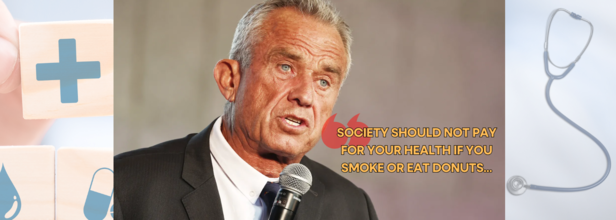
'Why Should Society Pay For Your Health?' RFK Jr. On Those Who Smoke Or Eat Donuts
"Should society bear the cost of health care for Americans who knowingly engage in unhealthy behaviors, such as smoking or excessive junk food consumption?"
In a recent interview with CBS News, U.S. Health Secretary Robert F. Kennedy Jr. raised this provocative question. Kennedy used examples like eating doughnuts or smoking three packs of cigarettes a day to illustrate his point, asking whether individuals should expect the same level of public support as those with congenital or unavoidable health conditions.
“I’m not going to take those choices away,” Kennedy emphasized, stressing that people should be free to eat and drink what they like. But he questioned whether society should be expected to fund the consequences of such choices, suggesting that incentives — both for individuals and industries — should be realigned to better support desired public health outcomes.
Public Health Experts Raise Concerns
Kennedy's remarks quickly drew criticism from health experts and advocates. Many viewed the statements as a slippery slope toward policies that could limit access to care based on personal behavior. Joan Alker of Georgetown University noted that this echoes past attempts, like West Virginia’s 2007 Medicaid plan that restricted benefits for patients who failed to follow health guidelines. That plan was eventually scrapped.
Critics warn that Kennedy’s comments hint at a punitive approach rather than one grounded in support, education, or evidence-based policy. Regina LaBelle, a former drug policy adviser, said the remarks marked a return to a time when public health relied more on “shame and stigma” than on science and support.
Cuts to Health Programs Add to Concerns
The timing of Kennedy’s statements is especially significant. They come amid major layoffs in his department, including at the CDC and FDA offices responsible for smoking cessation and tobacco regulation. Ironically, these are the very programs designed to prevent chronic illnesses before they start — illnesses often linked to smoking and poor nutrition.
Though Kennedy has pledged to focus on personal empowerment, the downsizing of health programs and public messaging campaigns raises doubts about how effectively the administration can support Americans in making healthier choices.
Mixed Reactions From Policy Circles
Not everyone disagrees with Kennedy’s stance. Michael Cannon of the Cato Institute welcomed the idea of holding individuals accountable for their choices, arguing that people are less likely to make harmful decisions when they must bear the consequences themselves. He said, “The Constitution doesn’t say anything about health, much less doughnuts and cigarettes.”
On the other hand, watchdog groups like Public Citizen pointed out the inconsistency in Kennedy’s health agenda. While he has criticized the role of corporations in promoting obesity, he has also expressed reluctance to expand access to costly weight-loss drugs, raising questions about how the government plans to tackle chronic health issues.
The Larger Debate
Kennedy’s comments open up a broader national debate: Where should the line be drawn between personal responsibility and public support in healthcare? As the U.S. grapples with rising health costs and growing chronic illness, this question is likely to resurface — with no easy answers in sight.

Credit: Canva
Can We Really Slow Down Aging? Yes, If We Combine Omega 3 With This Daily Supplement
Humans are obsessed with the concept of anti-ageing — that is, looking equal to or younger than their biological age. This fascination has prompted researchers and scientists to delve into finding various cures. Our bodies rely on essential nutrients to support the natural ageing process, and while some may help slow visible signs of ageing such as by promoting healthier skin, it’s important to remember that nutrition alone isn’t a magic bullet. Looking and feeling youthful involves a mix of lifestyle choices — and now, a new study shows that the right combination of supplements and exercise might play a significant role.
Professor Heike Bischoff-Ferrari and her team have found that daily supplementation of omega-3 fatty acids shows promising results in slowing biological ageing — at least in animals. When combined with vitamin D and strength training, this strategy also appears to slow down biological ageing in people over the age of 70. Beyond that, the combination may reduce the risk of infections and falls, prevent cancer, and lower the chance of developing premature frailty. “These results inspired us to measure the direct influence of these three therapies on biological ageing,” said the researchers.
To do that, they conducted a post hoc analysis involving 777 participants aged over 70 who were part of the DO-HEALTH trial — a three-year clinical study testing the impact of vitamin D (2,000 IU per day), omega-3 (1 gram per day), and a home-based exercise program. What makes this study notable is that it measured changes in four next-generation DNA methylation (DNAm) clocks: PhenoAge, GrimAge, GrimAge2, and DunedinPACE — all biomarkers that provide insights into how fast someone is biologically aging.
The findings? Omega-3 alone slowed the aging process across several of the DNAm clocks — specifically PhenoAge, GrimAge2, and DunedinPACE. But when combined with vitamin D and regular exercise, the trio had an additive effect on PhenoAge, indicating a stronger slowing of biological ageing.
From baseline to year three, the positive effects ranged from 2.9 to 3.8 months in slowed biological aging — a modest but meaningful difference. While that may sound small, in the context of ageing and long-term health outcomes, even minor delays can matter.
Though the findings are encouraging, the researchers stress that larger, more targeted clinical trials are needed to confirm the full impact of each therapy alone and in combination.
Still, for those aiming to age gracefully, the message is clear: omega-3 fatty acids, vitamin D, and regular strength training might just offer a natural, science-backed way to support healthy ageing — and they don’t require a trip to a high-end clinic or a fancy wellness retreat.

Credit: Canva
These Pills Can Significantly Cut Heart Attack, Stroke Risk: Study
Heart disease continues to top the list as the leading cause of death in the US, claiming around 700,000 lives annually. Now, new research suggests that nearly 50,000 of those deaths could be prevented each year with a simple but powerful treatment approach: combining cholesterol-lowering medications. "The combination therapy is safe and efficacious," said Maciej Banach, the study's first author and professor of cardiology at the John Paul II Catholic University of Lublin, Poland.
High cholesterol plays a central role in the development of heart disease by causing plaque buildup in arteries, which restricts blood flow and can lead to heart attacks or strokes. Statins, which reduce the liver’s production of cholesterol, are already commonly prescribed for patients at high risk. But Banach and his team found that pairing statins with ezetimibe—a drug that blocks the small intestine from absorbing cholesterol—can significantly improve outcomes.
Nearly 20% Reduction In Deaths
According to the findings, patients on the combination therapy saw a 19% reduction in the risk of early death, an 18% lower chance of experiencing a major cardiovascular event, and a 17% decrease in the risk of stroke. The findings were published in the journal Mayo Clinic Proceedings.
Ezetimibe, sold under the brand name Zetia, works differently from statins by targeting cholesterol absorption in the gut rather than production in the liver. The research challenges the traditional view that patients should be monitored on high-dose statins for at least two months before introducing ezetimibe.
Banach’s team based their recommendation on a review of 14 studies involving over 108,000 patients with blocked arteries. Their conclusion is clear: the combination approach shouldn’t be delayed.
“This study confirms that combined cholesterol-lowering therapy should be considered immediately and should be the gold standard for treatment of very high-risk patients,” said study co-author Peter Toth. “Simply adding ezetimibe to statin therapy, without waiting for at least two months to see the effects of statin monotherapy, which is suboptimal in many patients, is associated with more effective LDL goal achievement and is responsible for significant incremental reductions in cardiovascular health problems and deaths.”
The approach is also cost-effective. “It does not require additional funding or reimbursement of new expensive drugs,” Toth added. “In fact, it may translate into lower rates of first and subsequent heart attacks and stroke, and their complications like heart failure, which are extremely costly for all health care systems.”
Cardiovascular disease is responsible for nearly 20 million deaths globally each year, driven by high blood pressure, smoking, obesity, physical inactivity, diabetes, and high cholesterol. In the US alone, an estimated 94 million adults have borderline high cholesterol.
Dr. Benjamin Hirsh, director of preventive cardiology at North Shore University Hospital, said he hopes early combination therapy becomes the new standard. “For very high-risk patients, there is no reason to wait,” he said. "Aggressive reduction of LDL cholesterol is paramount."

Credits: Canva
Your Job Timings Could Be Putting Your Heart At Risk, But An Easy Eating Tweak May Help
In a world where hustle culture is glorified and work emails never stop, clocking more than 40 hours a week has become less of an exception and more of a rule. But this relentless grind might be doing more than just exhausting you—it could be straining your heart.
A number of large-scale studies, such as one in The Lancet of more than 600,000 people, have determined that working more than 55 hours a week is associated with a 33% higher risk of stroke and a 13% greater risk of coronary heart disease. Likewise, statistics gathered by the World Health Organization and International Labour Organization support this worry, citing a 35% increased risk of stroke and a 17% increased risk of death from ischemic heart disease in those who work more than 55 hours a week.
But here's the catch: a simple shift in when you eat—not what you eat—can potentially counteract some of this risk, even if your work hours remain the same.
As reported in a new study published in Nature Communications, scientists have found that daytime-only eating greatly minimizes cardiovascular risk factors in night shift workers. Which is to say, you might not need to leave your night shift job to keep your heart safe, just modify your window of opportunity.
Guided by Dr. Sarah Chellappa and Frank Scheer of Brigham and Women's Hospital, the research put 20 healthy volunteers in a highly regulated sleep lab for two weeks. Everyone went through a simulated night shift, remaining awake for 32 hours to throw their internal body clocks off.
Here's what was so innovative about the study: although everyone had the same sleep schedule, only a portion of them were allowed to eat during the day. The others could eat through the night, replicating usual shift-worker behavior.
Those who ate at night saw a marked increase in heart-related risk factors, but those who ate just during the day did not experience such an increase, even though both groups were eating the same meals.
What is Circadian Alignment?
Why it works comes down to a process known as circadian misalignment—when your behaviors such as eating and sleeping are not aligned with your internal body clock. Your circadian rhythm not only dictates your sleep-wake pattern, but also how your body processes food and controls blood pressure, inflammation, and hormone secretion.
Breaking this cycle, particularly by consuming food when your body is anticipating to be in rest mode, results in metabolic confusion. This can raise your risk of insulin resistance, elevated blood pressure, and systemic inflammation—prime drivers of cardiovascular disease.
"Coordinating eating with the body's internal clock might be a simple intervention," according to Dr. Chellappa. "Even if your sleep is disrupted by work needs, confining eating to daylight hours may provide significant protection."
Why Long Work Hours Remain a Red Flag?
Despite the best meal timing, long work hours remain hazardous. Longer workdays tend to be linked to:
- Sedentary living, particularly in office jobs
- Ate-on-the-run, which contributes to making unhealthy food choices that are rich in processed fat and poor in nutrients
- Chronic stress, which can cause an increase in cortisol levels and blood pressure
- Sleep deprivation, which on its own raises heart disease risk
- Overlooked self-care, such as forgotten doctor visits and infrequent exercise
These bad habits accumulate over time, and in the process, may cause undiagnosed conditions such as hypertension or type 2 diabetes—both leading causes of heart disease.
Is There an Escape from Shift Work Dilemma?
Numerous professionals—nurses, factory workers, emergency responders—are stuck with night shifts. But they don't have to be trapped. Research like this provides a glimmer of hope and emphasizes that even slight lifestyle adjustments can provide immense benefits.
By limiting food to daytime, employees can cut cardiovascular risk indicators in half. This adjustment does not involve adopting a new regimen, gym membership, or pricey supplements. It merely entails dining with the sun, not the shift.
Strategic Tips to a Healthier Work-Life Balance
Should you be working long hours or saddled with odd shifts, here's how to care for your heart while maintaining work pace:
Plan your food: Prepare healthy meals on days off so you're less likely to be tempted by processed or late-night foods.
Create eating windows: Attempt to be done with meals by early evening—even if you stay up late. Keep water on hand, but avoid the snacks.
Guard your breaks: Go outside, stretch, and walk—activity throughout your workday can balance out sitting-associated dangers.
Schedule your check-ups: Don't let work cause health to become a backburner activity. Standard screenings can identify silent problems early.
Reduce stress: A short meditation session, writing in a journal, or even a brief phone conversation with someone you love can help de-stress.
Yes, your work might be intense. And yes, there might be long hours certain times of the year. But shielding your heart doesn't necessarily mean an entire lifestyle change. According to this new research, how you eat might be just as important as what you eat.
© 2024 Bennett, Coleman & Company Limited

